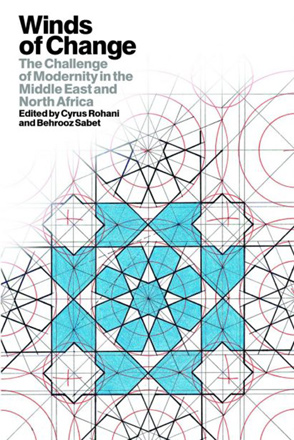Winds of Change: The Challenge of Modernity in the Middle East and North Africa
Edited by Cyrus Rohani and Behrooz Sabet
London: Saqi Books, 2019
Pp. 304
In this interdisciplinary volume, fourteen scholars address a variety of issues with the aim of promoting understanding, dialogue and cooperation around the Middle East’s role in the world. In view of the importance of Islam in the region, the contributors include scholars in Islamic studies, both Muslims and non-Muslims. According to editors Cyrus Rohani and Behrooz Sabet, the “focus of this book is on long-range approaches that require a fundamental transformation of the current system of values and patterns of thought”. (p. x)
It is assumed that the Middle East is in crisis—an evaluation that few would contest. While the Arab uprisings reasserted the question of democracy, the outcome so far has been mixed. Left unresolved are a series of tensions — between religion and secularism, tradition and modernity, continuity and novelty, local and universal values, tribalism and globalism, faith and reason, technology and culture, dogma and critical thinking. According to the editors, “For some time, the Middle Eastern countries have merely been consumers of goods, services and ideas from the outside world. Illiteracy and cultural stagnation have caused deep psychological humiliation.” (p. 9)
While acknowledging that the colonial past can be faulted for many problems, several contributors note that this has ended, and governments and people in the region should stop blaming outside factors and recognise that the crisis is internal. One cannot dispute that people should work towards solving their society’s problems, but the elephant in the room is Israel, which is hardly mentioned in the book, but continues to act as a hostile, settler-colonial state. Besides systematically depriving the Palestinian people of their rights, Israel has had deep, negative effects on the surrounding Arab states, prodding them towards increased militarisation. Similarly, the devastating wars led by the United States against Iraq, which unleashed many of the current conflicts, are hardly mentioned. Reading the admirable proposals for openness and cooperation between states and globally, one wonders how these two aggressive powers fit into this optimistic prognosis: “If the Middle Eastern countries were able to overcome their current crises and conflicts and move towards democracy — moving beyond sectarianism and unifying their own values with the universal values that currently constitute the modern world — we would eventually witness an astounding integration of more than twenty countries, ultimately adding vast amounts of natural and human resources to the world.” (p. 24)
Nonetheless, there are many useful ideas in the book. Middle East leaders are urged to cease the culture of violence, to develop the skills for bringing order and creativity out of chaos, to promote pluralism, diversity, consultation and planning, end corruption and empower citizens. A chapter about confronting violence through dialogue cites historical and international efforts and shares the experience of interfaith dialogue in Iraq in 2015, including statistics that overwhelmingly indicate youth’s greater propensity for tolerance. Jordan’s Royal Institute for Inter-Faith Studies, Ahlulbayt Islamic Thought Foundation, and the Jordanian Interfaith Coexistence Research Centre are listed among current, positive frameworks in the region, which need to be escalated with more focus on the participation of youth and women. Another chapter on non-violence contends that authoritarian-style modernisation and secularisation has no future, but laments that non-violence has not been successful in the Middle East as in India. There is hope, however, in the First Palestinian Intifada, the Tunisian and Egyptian revolutions, and the 2009 Green Movement in Iran.
Justice is singled out as the value stressed in the Koran which could bring Muslim ethics in line with universal ones, while principles of good governance can also be found in Islamic tradition. By studying the rationalist tradition in Islam, it is possible “to locate those places where the ideals of the European Enlightenment overlap with the Qur’an and the thoughts of the Muslim modernists”, indicating that the “intellectual resources for modernisation are within Islam itself”. (pp. 146, 153)
A chapter on women’s rights finds the main problem in the gap between laws and their implementation, as well as women’s overall status in society, arguing that improvement cannot come via international bodies but by building a local counterculture to engage the broader public in support of women’s rights.
Notwithstanding advances made in education in the region, there persists an imbalance between education, required life skills, and job requirements. Transformation of the educational system is required, cultivating freedom of thought and expression, critical thinking and problem-solving, strengthening the social sciences and abandoning dogmatism. However, based on Jordan’s experience, one must take exception to the assessment that “All reports from the region suggest that efforts to teach a second language, particularly English… remain insufficient and unsuccessful”. (p. 203)
Most economists believe that the economic challenges faced by the Middle East are aggravated by a relatively low level of integration into the world economy. Yet, there is justified scepticism about globalisation, seeing that it promotes consumerism at the expense of spiritual values and cultural diversity. However, if science and religion are recognised as being complementary, globalisation can be reconceptualised as can many environmental and sustainability issues; again, justice is paramount.
